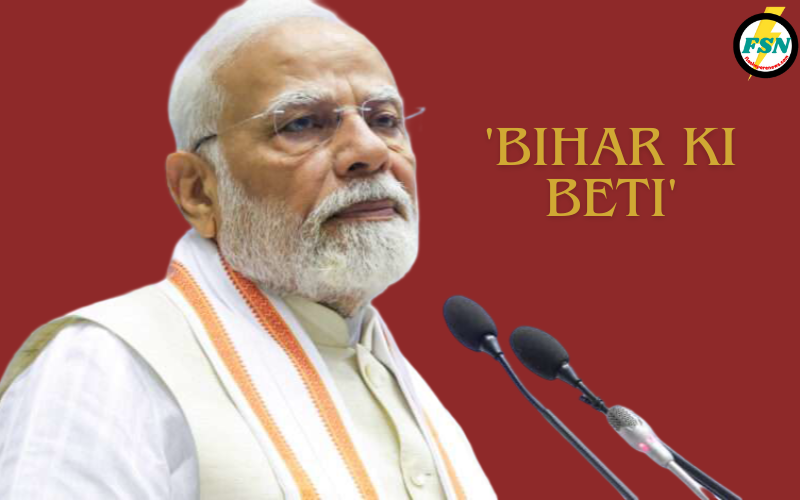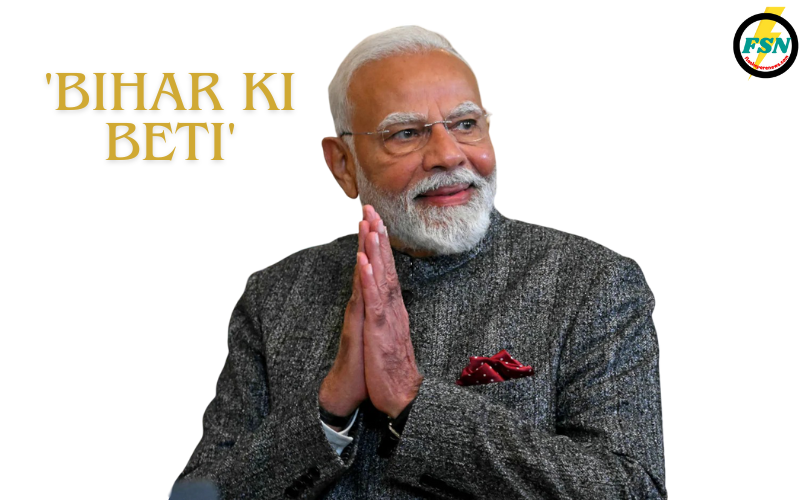PM Modi Praises Trinidad and Tobago PM as ‘Bihar Ki Beti’, Strengthens India-Caribbean Diplomatic Ties
In a significant diplomatic and emotional gesture, Prime Minister Narendra Modi recently referred to the Prime Minister of Trinidad and Tobago, Dr. Keith Rowley’s counterpart, as “Bihar Ki Beti” — a term that resonated deeply with people across India and among the Indian diaspora. The statement was made during a public address while highlighting the historical and cultural bonds between India and the Caribbean nation. PM Modi’s remark, laden with sentiment and pride, marked a milestone in India’s soft power diplomacy and cultural outreach, especially toward countries with strong Indian heritage roots.
The reference to “Bihar Ki Beti” comes in the context of Trinidad and Tobago’s Prime Minister’s Indian lineage. With millions of people of Indian origin residing in the Caribbean, many of them tracing their ancestry back to Bihar and Uttar Pradesh, this symbolic acknowledgment by Modi struck an emotional chord and signaled a renewed commitment to cultural and diplomatic ties.
Cultural Diplomacy Reimagined Through ‘Bihar Ki Beti’ Acknowledgement
Prime Minister Narendra Modi’s usage of the phrase “Bihar Ki Beti” during a public interaction underscored India’s growing inclination towards leveraging its cultural and ancestral connections as part of its foreign policy strategy. This gesture was more than a mere linguistic flourish — it was a testament to the strong emotional and cultural bridge that India seeks to strengthen with countries like Trinidad and Tobago.
The term ‘Bihar Ki Beti’ embodies not just familial ancestry, but a recognition of the contribution of the Indian diaspora to the fabric of other nations. In Trinidad and Tobago, over 40% of the population traces their roots back to India, and particularly to states like Bihar. This connection is a relic of the colonial era, where indentured laborers from India were taken to work in sugarcane plantations. Over generations, their descendants have retained cultural values, rituals, and even languages, preserving a unique Indo-Caribbean identity.
By referring to the leader of Trinidad and Tobago as ‘Bihar Ki Beti’, PM Modi tapped into this deep-seated heritage, invoking feelings of unity, pride, and global Indian identity. The phrase “Bihar Ki Beti” became a powerful metaphor for diaspora diplomacy.
PM Modi’s Remark Sparks Emotional Reactions and Political Discourse
The reaction to Prime Minister Modi’s statement has been overwhelmingly positive across Indian and diaspora communities. Social media erupted with praise, with hashtags such as #BiharKiBeti and #ModiDiplomacy trending on Twitter and Instagram. Many users highlighted how this phrase gave recognition to the Indian diaspora’s legacy, especially the Indo-Caribbean community that often feels overlooked in global diplomatic conversations.
News outlets across the Caribbean, the UK, the US, and India covered the story extensively. Several Indo-Caribbean leaders and academics expressed appreciation for PM Modi’s words, emphasizing how important such cultural recognitions are for fostering deeper international unity.
The phrase ‘Bihar Ki Beti’ also served as a strategic point in Modi’s broader vision of Vasudhaiva Kutumbakam – the world is one family. His emphasis on cultural identity and mutual respect in international forums has now found a new symbol in ‘Bihar Ki Beti’. The usage of culturally rich phrases creates soft power waves that ripple through public diplomacy, strengthening ties that are not only political but emotional and cultural too.
Strengthening the India-Caribbean Relationship Through Shared Heritage: Bihar Ki Beti as a Symbol
India and Trinidad and Tobago have shared a multifaceted relationship based on trade, culture, people-to-people ties, and diplomatic cooperation. Prime Minister Modi’s invocation of ‘Bihar Ki Beti’ serves to reinforce this relationship on a human level. Trinidad and Tobago is home to a large Indian-origin population, many of whom have actively contributed to the country’s political, economic, and cultural landscapes.
The acknowledgement of this shared ancestry fosters a sense of pride among Indo-Caribbeans and underscores India’s role as a cultural and emotional anchor for diasporic communities. When Modi called the PM of Trinidad and Tobago ‘Bihar Ki Beti’, he extended India’s embrace to all nations with roots entwined with India’s. This phrase has since become emblematic of cultural pride and diplomatic camaraderie.
Beyond symbolism, India and Trinidad and Tobago have collaborated in areas like information technology, pharmaceuticals, education, and renewable energy. High-level visits, bilateral trade agreements, and joint cultural festivals have strengthened these ties over the decades. With the spotlight now on heritage diplomacy, initiatives such as scholarships for Indo-Caribbean students, yoga festivals, and Hindi language promotions may further deepen bilateral engagement.
Historical Legacy of Indentured Migration and the Rise of ‘Bihar Ki Beti’ Narrative
The reference to ‘Bihar Ki Beti’ also invites reflection on the historic journey of Indian indentured laborers who migrated to Caribbean islands, including Trinidad and Tobago, in the 19th and early 20th centuries. These laborers, many from Bihar, Uttar Pradesh, and other parts of northern India, faced hardship, cultural dislocation, and exploitation, yet they persevered and built vibrant communities.
Today, their descendants are not only integrated into Caribbean society but also hold significant positions of leadership, governance, and cultural authority. The term ‘Bihar Ki Beti’ becomes more than an identity marker; it becomes a historical honor, acknowledging the struggle, endurance, and achievements of a resilient community.

Temples, cultural associations, and Indian classical music and dance schools thrive in Trinidad and Tobago — evidence of the enduring cultural legacy of Indian ancestors. Each year, celebrations like Phagwa (Holi), Diwali, and Indian Arrival Day remind citizens of this rich history. The phrase ‘Bihar Ki Beti’ therefore becomes a tribute to those who preserved their heritage through time.
Global Significance of ‘Bihar Ki Beti’ in Diaspora Diplomacy
Prime Minister Modi’s rhetorical brilliance often lies in his ability to fuse emotion with international relations. The term ‘Bihar Ki Beti’ is a prime example of this approach. In acknowledging the Caribbean leader’s heritage, Modi reminded the world of India’s far-reaching cultural impact and the interconnectedness of global Indian communities.
This term is not only significant for the Indo-Caribbean community but also for the Indian diaspora globally. From Fiji to South Africa, Mauritius to Suriname, communities that have roots in Bihar see the use of ‘Bihar Ki Beti’ as a celebration of their identity. It offers them a sense of belonging and visibility on the global stage.
In South Africa, for example, where the Indian diaspora also celebrates Indian Arrival Day, the acknowledgment of diaspora roots by Indian leadership strengthens cultural bonds. Indian embassies in such countries have begun promoting heritage festivals and storytelling initiatives focusing on diaspora narratives, which are now being branded with symbolic phrases like ‘Bihar Ki Beti’.
‘Bihar Ki Beti’: A Phrase That Echoes Across Borders
The term has gained prominence beyond diplomatic circles and has been picked up by educators, cultural scholars, and the media. Institutions in both India and Trinidad and Tobago have begun planning seminars and exchange programs to explore Indo-Caribbean ties further. Academic discussions around diaspora, heritage, and shared culture now have a new term to anchor upon — ‘Bihar Ki Beti’.
In schools and colleges in Trinidad and Tobago, teachers have used the phrase to educate younger generations about their heritage. Meanwhile, in Bihar, the phrase has evoked a sense of pride that transcends geographic borders. News outlets, too, have published features delving into the story of migration, heritage, and identity that the term encapsulates.
Indian cultural organizations across the world — in New York, Toronto, London, and Durban — have begun incorporating the term in events and workshops. Documentaries, short films, and diaspora literature now reference ‘Bihar Ki Beti’ as a symbol of belonging and perseverance.
The Political and Strategic Weight of ‘Bihar Ki Beti’
While deeply emotional and cultural in tone, PM Modi’s usage of ‘Bihar Ki Beti’ also carries political weight. It serves as a soft power tool that helps India assert its influence and maintain strong diplomatic channels with countries that have large Indian-origin populations. Such phrases help India maintain cultural diplomacy in an increasingly competitive global landscape.
It also subtly highlights India’s readiness to stand as a global leader that values its diaspora, its heritage, and its emotional ties. The phrase ‘Bihar Ki Beti’ thus becomes a cornerstone in India’s global outreach narrative.
In geopolitical terms, India’s increasing engagement with the Global South is reflected in such cultural linkages. By focusing on shared identity and roots, India’s diplomatic message becomes more palatable and personable. This fosters a deeper level of trust and cooperation, paving the way for future strategic alliances across continents.
Conclusion: ‘Bihar Ki Beti’ as a New Chapter in Cultural Diplomacy
Prime Minister Narendra Modi’s remark referring to the Trinidad and Tobago Prime Minister as ‘Bihar Ki Beti’ has opened up a new chapter in diaspora engagement and cultural diplomacy. It is a powerful narrative of identity, heritage, and pride. As India continues to assert its soft power on the global stage, phrases like ‘Bihar Ki Beti’ play a vital role in bridging emotional and historical connections.
Whether seen through the lens of diplomacy, history, or culture, the phrase ‘Bihar Ki Beti’ has emerged as a symbol of India’s global familial spirit. It reminds the world that the story of India is not just confined to its borders — it thrives in every corner of the globe where Indian roots have taken hold and blossomed.
From the shores of the Caribbean to the heartlands of Bihar, ‘Bihar Ki Beti’ now echoes as a call for unity, identity, and global Indian pride. And as this powerful phrase gains resonance, it may inspire more nations and leaders to embrace the past and celebrate the ancestral bonds that connect humanity in the most unexpected and beautiful ways.


